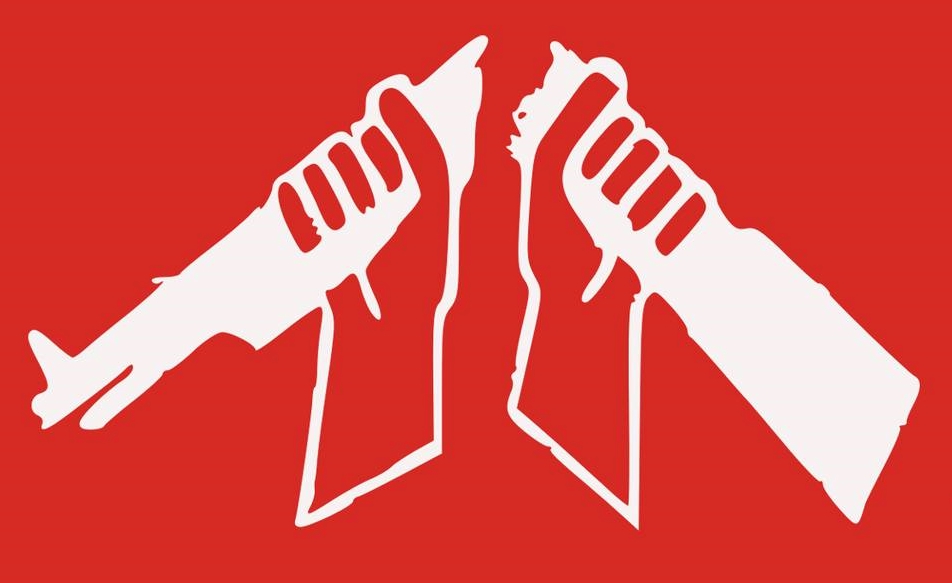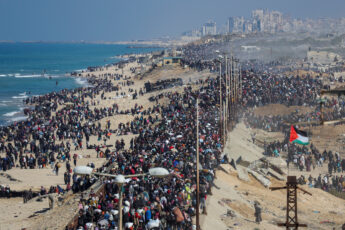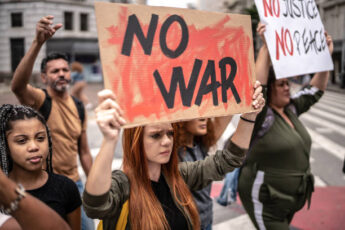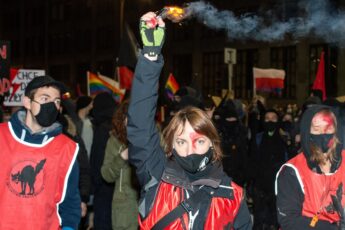
Right after the invasion of Ukraine, the TSS Platform published a statement titled No to War. For a Transnational Politics of Peace, which had a wide circulation. Its diffusion in Europe, from East to West, in the United States and Latin America has led to the creation of the Permanent Assembly Against War, a transnational space for discussion and organization not only to oppose the war, but to practice a politics that takes the side of those affected by the war in Ukraine, those who oppose the war in Russia, and all those who struggle not to be killed, exploited, and oppressed and who will suffer the consequences of the war on their living and working conditions. In order to support and give visibility to this process of organization and communication, we open a multi-voiced debate on what expectations the prospect of a transnational politics of peace raises, what its contents can or should be, what the obstacles to its realization are, and the plans for connections and actions that make it possible. The result is a first series of interviews with scholars and comrades who in recent years have contributed to the movement’s debate on issues, discourses and practices that a transnational politics of peace cannot ignore. We publish on this page the interviews to Jeremy Brecher (United States), Ida Dominijanni (Italy), Cinzia Arruzza and Tithi Bhattacharya (United States), Ranabir Samaddar (India).
Jeremy Brecher, an American historian, and activist has been active since the 1970s in the struggles and debates of the anti-war movement, the labor movement, and mobilizations for climate justice. He was one of the first to point out the political necessity of connecting environmental issues and workers’ struggles. Important in this sense is his Climate Insurgency Trilogy (2017). His publications against U.S. war crimes (In the Name of Democracy: American War Crimes in Iraq and Beyond, 2005) and on the globalization of social movements (Globalization from Below: The Power of Solidarity 2000 and Global Village or Global Pillage: Economic Reconstruction from the Bottom Up 2001) contain valuable insights for thinking about – as he states in the interview – the emerging transnational struggle and transnational politics of peace against states and capitalists, against their borders, hierarchies, and wars.
***
The transnational politics of peace wants to be something more than international solidarity. It has the claim to build transnational connections that, while saying no to war, at the same time contest its effects on the living and working conditions of millions of women and men, LGBTQIA+ people, workers, poor, migrants and non-migrants, not only in Ukraine and Russia. Do you think this claim is realistic, or do you think we should prioritize positioning over the reconfiguration of the geopolitical framework?
These two elements are not opposed, but rather linked.
The “reconfiguration of the geopolitical framework” is highly important but unpredictable, fluid, multi-layered, and difficult to influence. It involves not only states, but other political forces, including growing fascist and racist movements.
A senior diplomat at the Versailles peace conference in 1919 told an artist who was painting his portrait, “You know what they’re doing, don’t you? They’re choosing up sides for World War II.” Notwithstanding all the complexities, much of the current “reconfiguration of the geopolitical framework” can be understood as choosing up sides for World War III.
The transnational politics of peace requires two intertwined responses:
First, it must describe this reality and persuade people to reject, rather than identify with, the various forces that are positioning themselves for World War III. The primary reality is a struggle among great powers, in which smaller countries like Ukraine are being made pawns. To paraphrase Gramsci, they are being put in a situation where they are bound to play somebody else’s game, even though they of course must try to play their own game.
Second, those people who are harmed by this geopolitical struggle – notably workers, immigrants, women, the poor, racial, ethnic, and gender minorities, and other oppressed and discriminated-against groups around the world — can only protect themselves by organizing themselves transnationally as an independent force, allying with each other, making demands on states and capitalists, and backing them with disruptions that makes it harder for dominant forces to harm them. Halting the Ukraine war is central to their interests. Such transnational mobilization can support the peace movement not only in Russia but in the US and Europe.
In sum, self-organization from below for self-protection and self-preservation is a crucial means of containing the global destruction that is resulting from the “reconfiguration of the geopolitical framework.” It is hard to see how else that framework could be influenced.
European states and the US are trying to present themselves as the champions of a democratic internationalism against the advance of Putin’s authoritarianism. The violence of the European border regime and neo-liberal capitalism with its devastating effects especially in Central and Eastern Europe seems to be erased. The appeal of Western governments to democratic values, far from indicating a commitment to the enlargement of social or civil rights, is merely functional to the hardening of opposing war fronts. A transnational politics of peace cannot be exhausted only in the necessary request for the end of hostilities nor in the call for democracy. How can we articulate a discourse that takes into account these contradictions within and beyond the war?
The first step for such a discourse is to identify the Ukraine war as part of ongoing global maneuvering for domination. For the US, that means global domination, in which the entire world is its “sphere of influence.” It aspires to apply the “Monroe Doctrine” to the entire world. For Russia, it means domination of its traditional sphere of influence in Eastern Europe and a role in the Middle East and elsewhere. For China, it means increasing economic power around the world with a relatively low level of military risk and engagement. (I will leave it to others better informed than I to characterize the role(s) of Europe in this “reconfiguration.”)
Within such a framework, a discourse may become possible in which all the great power contenders are seen as “enemies of humanity” and of the many specific groups of which we humans are composed. Conversely, all who struggle to limit and ultimately end their destruction can be seen as friends, allies, and comrades.
From Ukraine, critical voices have been raised against a part of the Western left, which has ignored over the years what was happening in the East and now reads the situation in the framework of anti-American anti-imperialism or democratic Europeanism, with lenses and positions that are no longer suitable to the present. What does this war force us to see and what patterns and models does it force us to abandon?
Let me start with the situation in the US and with the context outside the left. A substantial portion of US national leadership and a sector of the Right sees the Ukraine war as an opportunity to increase US global domination. They openly portray a long war as a means to weaken Russia and undermine the Putin regime, while expanding US economic, military, and political power in Eastern Europe. Another sector of the Right supports Putin’s white racist authoritarian politics. Most ordinary folks are primarily responding to the fact of Russian aggression and to the devastation it is causing for Ukrainians.
The largest part of the US left has condemned the Russian invasion of Ukraine while also pointing out the provocative and perfidious behavior of the US and NATO since 1989. A small sector, many of whom once identified the Soviet Union as leader of the world’s “progressive forces,” refuse to call Russia’s assault an invasion and justify it on the basis of NATO expansionism, Ukrainian harboring of Nazis, and the priority of resisting US imperialism, notwithstanding the obvious racist, imperialist, and fascist tendencies of the Russian regime.

At the opposite pole, a substantial number of those on the left have been so horrified by Russian aggression and brutality, and so inspired by Ukrainian resistance, that they ignore or deny US and NATO roles in provoking the invasion and advocate expanded military support for Ukraine. They also are reverting to a frame of “American exceptionalism” that celebrates a double standard in which atrocities by Russians and other “foreigners” are excoriated but Mai Lai, Fallujah, and 78 days of the bombing of Serbia are forgotten.
What is largely missing from all sides is an analysis of the world order as an interactive whole and the nation-state and superpower systems as composed of competing elements jostling each other into mutual destruction. In the Cold War era, an understanding gradually developed that the opposed nuclear powers were actually part of an interactive system which at any point might go out of balance and lead to nuclear Armageddon. Detente and partial nuclear disarmament were in part a result of this realization. We need a similar systemic understanding of today’s world crisis.
The war in Ukraine is a patriarchal war because it is reaffirming with bombs all the hierarchies that we contest. Men must be soldiers and show by fighting that they are true patriotic males. Transgender women cannot leave Ukraine because the border guards identify them as men. Women are treated as weak and powerless objects of protection, and the hundreds of thousands of migrants fleeing Ukraine will most likely be employed as a devalued labor force in essential sectors or in domestic work. How do you think a transnational politics of peace can challenge patriarchal and sexual hierarchies that the war is strengthening?
The Ukraine war’s concrete harms to women and its exacerbation of structural sexism are reasons for an immediate cease-fire. They are reasons for serious negotiations and against pursuing a “long war” and “total victory over Russia and Putin.”
Women are likely to be central to an emerging transnational struggle against the ramifying war for world domination. The rise of a global women’s movement was a critical early part of the globalization of social movements that occurred in the later decades of the 20th century. Women have been at the forefront of the movements of the 21st century in the US and much of the rest of the world, including the climate movement, Black Lives Matter, reproductive rights, and LGBTQ+ rights. In Russia women have been early initiators of the opposition to war in Ukraine. All of these involved perceiving the bonds connecting women as transcending national and other boundaries and hierarchies.
Someone argued that this war marks the end of globalization. What do you think will be the long-term transformations of this war that transnational peace politics must prepare for?
These are still “early days” for evaluating the impacts of the Ukraine war. Current alignments and polarizations are tendential, not final. Many more surprises still lie ahead.
Globalization is inherently unstable. As I wrote in Globalization from Below back in 2002, what will come after it “could be a war of all against all, world domination by a single superpower, a tyrannical alliance of global elites, global ecological catastrophe, or some combination thereof.”
The Ukraine war is showing how intertwined the global economy has become and how big a gash is left when pieces of it – e.g. finance, food, energy, logistics, health – are even partially de-globalized. While there will be plenty of economic nationalism – using state power to aggrandize one or another economic player – it will be extremely difficult to return to integrated and relatively autonomous national economies. A high level of economic conflict and chaos is a far more likely result.
In the resulting struggle, various nations and other players will likely try to “line up” segments of the population to back their economic interests against others. A transnational vision of common interests among ordinary people may be a crucial means to counter this.
The transnational politics of peace must act in the short term, in the face of the urgency of the war, but it must also be able to give itself an autonomous, longer-term perspective. How do you think these two dimensions can be combined?
The starting point for both short- and long-term efforts is to spotlight the drive to mutual destruction among states, capitalists, and national and transnational elites. This includes the short-term folly of the Russian invasion of Ukraine. It includes the Western folly of denigrating serious negotiations and seeking a “long war” despite the Ukrainian government’s repeated calls for a negotiated settlement. It includes the rapid expansion of nuclear arsenals and the growing willingness to threaten the use of nuclear weapons. It includes the ongoing exacerbation of the doomsday threat of climate change.
The emergence of a “transnational politics of peace” is one of the few hopeful signs in these dark times. Because it is transnational, it is positioned to identify not just one or another country or leader as the problem, but more importantly the careening world order and the systems (nation-state, market, corporate, fossil fuel, etc.) that compose it. At the same time, a transnational politics of peace is positioned to support resistance to the immediate harms being visited by the Ukraine war on people not only in Ukraine but all over the world.





